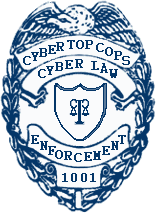PayPal Urgent Notification Phishing Scam
PLEASE NOTE: PayPal is NOT responsible for these e-mail scams. Organisations and individuals pretending to be PayPal initiate them. PayPal.com, PayPal, and all related logos are either trademarks or registered trademarks of PayPal, Inc., or its licensors. Cyber Top Cops is in no way affiliated with PayPal.
Date: 27 September 2005Received from pp@paypalssl.com
Subject: PayPal Urgent Notifycation (No, we did not misspell Notification!)


In order to operate the PayPal service and to reduce the risk of fraud, PayPal Corp. will ask you monthly to provide us information about yourself and your credit card and/or bank account. The Privacy Policy describes the information we collect and how we use that information.
Unable to do so may result to abnormal account behavior during transactions and a suspended account.
PayPal is committed to handling your customer information with high standards of information security. Your credit card and bank account information are stored only in encrypted form on computers that are not connected to the Internet. We restrict access to your personally identifiable information to employees who need to know that information in order to provide products or services to you. We maintain physical, electronic and procedural safeguards that comply with federal regulations to guard your nonpublic personal information. We test our security systems regularly and also contract with outside companies to audit our security systems and processes.
Stay protected online. Get Verified
What does it mean to be Verified?
Verification increases the security of the PayPal network. Verified members have successfully completed PayPal's verification system to establish their identity with us. The verification process varies by country. For example, in the U.S., a Verified member has confirmed a bank account with PayPal. In Germany, a Verified member has completed a bank transfer or the Expanded Use Process. In most countries where PayPal is available, a Verified member has added a credit card and completed the Expanded Use process.
Why does PayPal ask its members to become Verified?
PayPal encourages members to become Verified to increase trust and safety in our community. Because financial institutions screen their account holders, PayPal's verification process increases security when you pay parties you do not know.
Do I have to become Verified?
Once you have reached your sending limit with your PayPal account, you must become Verified to continue sending money with our service.
Can I pay with my bank account?
Yes. When you add your bank account, it becomes your default funding source for PayPal purchases when your PayPal account balance isn't enough to cover the transaction. You can always select other available funding sources at the time of purchase.
How does verification benefit me?
Verification gives you more information about the people with whom you transact through PayPal, so you may make more informed decisions. PayPal encourages members to become Verified to build trust in our community.
How do I take advantage of PayPal's verification process?
There are several ways to take advantage of PayPal's verification process and decrease your fraud risks:
- When you receive a payment: Login to your account and go to the "History" subtab of the "My Account" tab. Find the payment in question and choose the status link (e.g. "Pending") in the Status column. This will take you to a payment details page. Next to the sender's name, you will find their verification status (Verified, Unverified).
- When you send a payment: As you are sending a payment, on the "Send Money - check the details of your payment" page, a reputation link is provided where you may view the recipient's status (Verified, Unverified).
Note: PayPal's verification system does not constitute an endorsement of a member, nor a guarantee of a member's business practices. You should always consider other indicators when evaluating members, including length of PayPal membership and reputation scores (on eBay or other shopping sites, if applicable).
Copyright © 1999-2005 PayPal. All rights reserved.

Quote: "Your credit card and bank account information are stored only in encrypted form on computers that are not connected to the Internet."
Isn't this ironic? If the computers containing your personal information are not connected to the Internet, how on earth do they think do you connect to the server where you enter your information? Is this information perhaps being transmitted through thin air?







